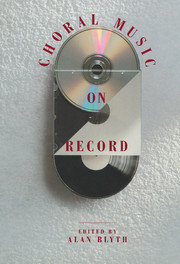Book contents
- Frontmatter
- Contents
- Preface
- Monteverdi: Vespers (1610)
- J.S. Bach: St John Passion
- J.S. Bach: St Matthew Passion
- J.S. Bach: Mass in B Minor
- Handel: Messiah
- Mozart: Requiem Mass
- Haydn: The Creation
- Haydn: The Seasons
- Beethoven: Missa Solemnis
- Mendelssohn: Elijah
- Rossini: Stabat mater Petite messe solennelle
- Berlioz: Grande Messe des Morts Te Deum L'Enfance du Christ
- Verdi: Requiem Mass
- Brahms: A German Requiem
- Fauré: Requiem
- Elgar: The Dream of Gerontius
- Walton: Belshazzar's Feast, Tippett: A Child of Our Time, Britten: War Requiem
- Stravinsky: The Wedding Symphony of Psalms
- Janáček: Glagolitic Mass
- Discographies
- Index
Elgar: The Dream of Gerontius
Published online by Cambridge University Press: 02 December 2009
- Frontmatter
- Contents
- Preface
- Monteverdi: Vespers (1610)
- J.S. Bach: St John Passion
- J.S. Bach: St Matthew Passion
- J.S. Bach: Mass in B Minor
- Handel: Messiah
- Mozart: Requiem Mass
- Haydn: The Creation
- Haydn: The Seasons
- Beethoven: Missa Solemnis
- Mendelssohn: Elijah
- Rossini: Stabat mater Petite messe solennelle
- Berlioz: Grande Messe des Morts Te Deum L'Enfance du Christ
- Verdi: Requiem Mass
- Brahms: A German Requiem
- Fauré: Requiem
- Elgar: The Dream of Gerontius
- Walton: Belshazzar's Feast, Tippett: A Child of Our Time, Britten: War Requiem
- Stravinsky: The Wedding Symphony of Psalms
- Janáček: Glagolitic Mass
- Discographies
- Index
Summary
For many Gerontius is Elgar's outright masterpiece. Having completed the work in the summer of 1900, he commented: ‘The trees are singing my music. Or have I sung theirs?’ So he himself sensed that the work had a special power and beauty, confirmed when he signed off the score ‘This is the best of me’. As David Cairns has remarked: ‘No other work of his carries so strong a sense, in a good performance, of having been given, of coming from deep and ancient wells of experience.’ There is something inevitable in the setting of Cardinal Newman's text that suggests the work has somehow been there since time immemorial, and that setting itself, combining parlando and lyrical outpouring as appropriate, provides a style perfectly attuned to the deeply felt emotions of the words. A devout Catholic, Elgar responded to the mystical sincerity of Newman's vision with his own. At the same time the work is as close as Elgar came to writing opera. In a convincing performance, the dramatic quality of the writing should carry all before it. And all the recorded accounts of the work are convincing because artists seem to respond instinctively to the greatness in the writing and give of their very best.
That is true even of the very early (1924) version on Edison Bell, although this is little more than a curiosity. The work is substantially foreshortened, the choruses are sung by a choir of just eight solo singers, and the orchestra consists of just twenty-four players! The results are, to say the least, not very satisfactory. But these seven 78rpm discs are not without interest.
- Type
- Chapter
- Information
- Choral Music on Record , pp. 227 - 235Publisher: Cambridge University PressPrint publication year: 1991

